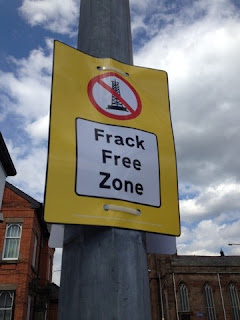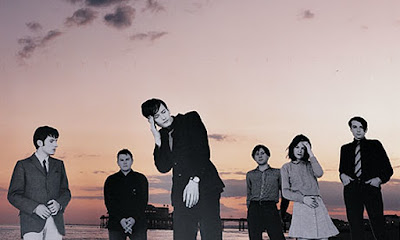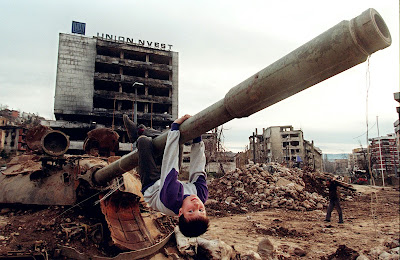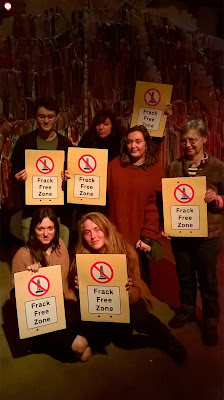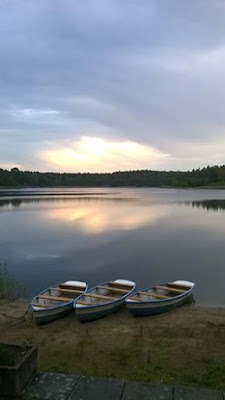The year began with us still waiting for the vote by Lancashire County Council on the first application for the commercial extraction of shale gas in the UK. It had been scheduled for New Years Eve, but was delayed until 28 January.
I was there, as was Mr Frackhead, but, under threat of legal action from Cuadrilla, Lancashire were forced to delay the vote again.
On the same day I made my début as a Further Education lecture, when I had a guest spot on Manchester Metropolitan Sustainable Aviation course. Basically I turned up for the afternoon to say "Sorry guys, it ain't".
Meanwhile in Greece patience with austerity came to an end and a gaggle of lefties and academics going by the name of Syriza swept into power. Things were going to get interesting down there.
February
 We have a little time out from climate change to campaign against Santander, who were lending money to APRIL, a company trashing the Indonesian rainforest. After one of Greenpeace's shortest campaigns ever Santander threw in the towel.
We have a little time out from climate change to campaign against Santander, who were lending money to APRIL, a company trashing the Indonesian rainforest. After one of Greenpeace's shortest campaigns ever Santander threw in the towel.With that one won we could spend more time on another project, campaigning for sustainable tuna. This had us sneaking around supermarkets trying to get people to take notice of the wildlife destruction and human slavery that was the true cost of their little tin of John West. This one was going to keep us busy for the rest of the year.
March
In March the countdown to Paris really began, with the Time to Act Climate Change March. I was a
Steward, up at the front, so I had very little idea how many thousands of people were behind me, but there were a lot.
Star speaker was twelve year old Laurel. There is only one arrest of the day - Ben - who was only there because I'd given him a free ticket on the bus. He'd been sitting on Westminster Bridge with the Plane Stupid polar bears when the police had waded in and nicked him. Well, I guess you look a lot less daft cuffing a lippy punk rather than a polar bear.
Also in March the Bleak and Desolate north got its own polar bear as Sami came to visit us. He had a busy eight months ahead of him.
April
By April we were seriously into General Election campaigning. Usually environmentalist have a holiday whilst the country talks about less important issues, but this time both climate change and fracking featured heavily. I attended several hustings and chaired on in Cheadle on energy policy, which allowed me to talk about both Climate Change and fracking. All the candidates seemed very bright - except the one who eventually won.
We also lobbied hard to get candidates to sign the Greenpeace Frack Free Promise, having 100% success with Green hopefuls and some success with Labour. Greenpeace also had me out at night doing some other activities, so all told I worked bloody hard during this campaign. It was just a pity it all counted for so little in the end.
The highlight was Krishnan Guru-Murphy popping by to interview me at Barton Moss for a Channel Four News piece on fracking. Supposedly he came by bike, but in reality it was a van - with the bike in the back - but then this was a fake election in which the politicians never actually met real people and rarely debated the real issues.
May
There was a bit of welcome relief from electoral gloom as Glossop North End qualify for the final of the FA Vase and I went down to London with my boys to watch them. One person in six from Glossop was there, but as the entire town could fit in the stadium three times over we still don't fill Wembley. Glossop were ten minutes away from the cup, but in the end North Shields proved the stronger team. We stayed over in London though and got to see the VE Day celebrations, including a parade of very old veterans who fought for the Human Rights Act the government has now pledged to abolish.
Also in May I made my debut as a Glossop Guild Tutor, although as the Glossop North End team were touring the town in an open topped bus that evening my thunder was well and truly stolen.
We showed the film Black Ice in Manchester and had a visitation from the one and only Phil-of-the-Arctic, who told us of his time as a guest of Mr Putin.
But of course the big news this months was that country went mad an voted for five more years of austerity, mostly it seems to annoy the Scots. With five more years of austerity in view I got an email from Greece which said "Welcome to our nightmare".
June
I was back in London again for the Mass Lobby of Parliament on climate change, another part of the build up to Paris. We waited outside and a succession of MPs were brought out in rickshaws, but mine wouldn't play that game so I had to go into Portcullis House. Unfortunately he had little to say on the subject.
However the big story this month was the Lancashire vote on granting Cuadrilla Resources permission to frack finally happend. There was a great turnout on the day. As well as the Lancashire anti-frackers there were Greenpeace activists from across the Bleak and Desolate North, Frack Free Greater Manchester people and veterans of Barton Moss. At the end of the day there are speeches, and I got to speak on the same platform as Vivienne Westwood and the awesome Asad Rehman.
Proceedings went into a second day and some seriously dodgy legal advice from Lancashire's house lawyer put the whole decision in doubt. Everything it was postponed until the following Monday, so I had to go up there again. Greenpeace sent Daisy and Richard up from the office and we wait for the news. I had to go back to work, stopping off for a quick interview with Key 103, so I was on the M62 when the new broke that we'd actually won. It was an amazing result, the payback for four years of village meetings and hard work by Frack Free Lancashire.
July
 Whilst we were celebrating in Lancashire, things were coming to a head in Greece. After two weeks of having to queue daily for money (something the jovial Greeks made into a social occasion) the country voted on whether or not to accept austerity. I did my bit and spoke at the Manchester Greek Solidarity day in Piccadilly Gardens.
Whilst we were celebrating in Lancashire, things were coming to a head in Greece. After two weeks of having to queue daily for money (something the jovial Greeks made into a social occasion) the country voted on whether or not to accept austerity. I did my bit and spoke at the Manchester Greek Solidarity day in Piccadilly Gardens. Despite some pretty amazing attempts by big employers to bribe their workers into voting Nai, and despite a significant block of pro-austerity pensioners, Greece unambiguously rejected austerity. It turned out to be a Pyrrhic victory, but a victory in no doubt it was on that day. In the long run it didn't do much for Greece, but it inspired us.
Also in July it was back to Lancashire for Pagacon in Preston. Apart from the speakers we had the one and only Damh the Bard performing a set and leading us in an anti-fracking ritual, as well as the massively underrated George Nicholas and Cernunnos Rising, who performed their song The Folly of Fracking. There was a bit of a theme here I think.
August
In August I took a holiday, or two, in Cumbria and East Anglia. Wonderful places.
September
But in September it was back to campaigning, and straight away we scored out biggest success of the year. After five years of actions around the world, Greenpeace forced Shell to abandon its plans to drill for oil in the Arctic. It was a massive victory, one of the biggest in Greenpeace's history.
Also that month it was the premier of the film How To Change The World, about the origins of Greenpeace. The Manchester Network dressed up for the occasion and we enjoyed it. I'd met Paul Watson, and campaigned against Patrick Moore over The Great Bear Rainforest (we won), but Bob Hunter's words were new to me. It introduced a few quotes I intend to use more often, including "our goal wasn't to make ourselves famous, it was to make nature famous".
October
I was inside Sami again for the end of the conference, as we reminded the 'greenest government ever' that they're a complete disaster for the planet.
November
Tuna work continued, with more clandestine visits to supermarkets across Manchester.
We also spend the month waiting for the government vote on fracking under National Parks, which got me some local press coverage.
But the big news this month was that the countdown to Paris finally came to an end as the entire world - except France - marching for climate justice.
I was in London with Emma Thompson and the Greenpeace team. Thom Yorke was DJ so Sami become a dancing bear. It was a remarkable day and a terrific turnout, far and away the biggest environmental rally I've ever been to. This really was a mass movement now.
December
And so it was December and my trip to Paris. A state of emergency, public gatherings of more than three people banned and activists under house arrest were what was waiting for me. I travelled down with Friends of the Earth and decided to play it by ear. It turned out I wasn't the only one and, as well as a very well attended international gathering the Climate Action Zone, there was a decent turnout for the 'illegal' Red Lines action.
I got to see the Arch de Triumph and Eiffel Tower, meet activists from around the world, including Greenpeace International boss Kumi Naidoo, see the French riot police and get hit by a giant inflatable cobblestone. Pity the deal itself was so toothless.
Back home in England though it was as if I'd never been away, as in the following week the government government slashed solar subsidies, allowed fracking under National Parks and licensed a considerable chunk of the north of England for fracking. Still, it gave me a chance to get my face on the TV, my name in the papers and my voice on the radio, where I had an interesting one-to-one with the director of Ineos.
So that was my year. I've been to Preston and Paris. I helped stop Cuadrilla fracking in Lancashire, but failed to stop the Tories being re-elected. I've spoken to rallies against fracking and in support of Greece. I've lectured to the Glossop Guild and the Manchester Sustainable Aviation students. I've marched for the climate, against the Tories and both for a hoped for deal in Paris and against the actual deal in Paris. I've been inside a polar bear. I've been to an illegal demo. I've helped beat Santander. I've helped beat Shell. I've met Vivienne Westwood. I've met Kumi Naidoo.
It's been good, it's been bad, but it's not over.
Thanks for everyone who's been there with me. In 2016 we do it again, but we do it better.
Happy New Year!



